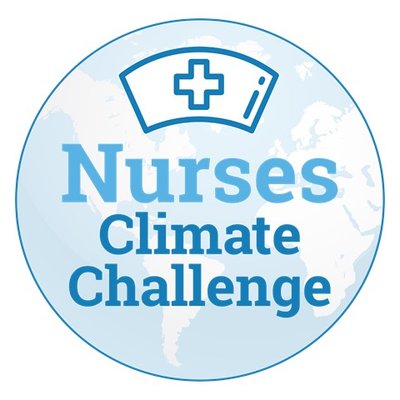UMSON Accepts the Nurses Climate Challenge
July 14, 2020 Giordana Segneri
UMSON is one of the first schools of nursing to accept the Nurses Climate Challenge, a national campaign led by Health Care Without Harm and the Alliance of Nurses for Healthy Environments.
For months, the COVID-19 pandemic has consumed the world’s attention, forcing everyone to adjust the ways we live, work, study, worship, and more, shifting priorities and focus. But, as the authors of “A Perspective: Climate Leadership Amidst COVID-19” wrote in the ecoAmerica blog, “our other big challenges, especially climate change, have not gone away. If we look at addressing these challenges in tandem, the COVID-19 crisis provides useful guidance for addressing our climate emergency.” That emergency is ongoing, despite documented positive environmental and climate effects of the pandemic, such as reductions in smog and cleaner water in areas across the globe.
In February, UMSON became one of the first four schools of nursing nationwide to accept the Nurses Climate Challenge, a national campaign led by Health Care Without Harm and the Alliance of Nurses for Healthy Environments. The initiative’s goal is to engage nursing students, nurses, and nurse educators in informing 50,000 health professionals and students about the health impacts of climate change by 2022.
“Now, more than ever, a focus on climate change is imperative, and nurses are in a unique position as holistic care providers to lead the efforts,” says Robyn Gilden, PhD ’10, MS ’01 RN, assistant professor, who serves as the School of Nursing’s lead on the climate challenge. “With increasing severity of storms and wildfires, the hottest May on record worldwide, and emerging links between COVID-19 and climate change, there is much work for health care providers to do. As the nation’s most trusted professionals, nurses can lead the charge to significantly improve society’s response to climate change and foster the strategies needed for a healthy future for everyone.”
To participate in the climate challenge, UMSON has committed to meeting certain goals and implementing certain educational initiatives, including:
- creating an Undergraduate Climate Change elective in 2017 that has educated 92 students since going online (completed)
- incorporating climate change education as part of at least four courses (completed)
- offering guest lectures on climate change in a variety of undergraduate and Clinical Nurse Leader master’s community/public health nursing classes (completed)
- implementing practical education on sustainability and waste segregation in the Clinical Simulation Labs (completed)
- hosting a Climate for Health Ambassadors training (to come, on hold due to COVID-19)
- distributing a campuswide Climate, Health and Nursing Tool (CHANT), a psychometrically tested survey instrument evaluating nurses’ and nursing students’ awareness, experience, motivation, and behaviors related to climate change and health (to come).
UMSON’s participation in the challenge is an opportunity to include nursing students at all levels to participate in this movement.
In 2015, Dean Jane M. Kirschling, PhD, RN, FAAN, signed the White House’s Health Educators Climate Commitment, and UMSON joined more than 100 other health professions schools in doing so. Gilden was appointed as UMSON’s representative in upholding that commitment. In that role, she led the School in joining the Global Consortium on Climate and Health Education based at the Columbia University Mailman School of Public Health and became chair of UMSON’s Climate Change Workgroup. “Part of the workgroup’s mission is to implement changes to the curriculum to better prepare the next generation of nurse educators, clinicians, and researchers to address the climate crisis,” she says.
Learn about more of UMSON’s efforts to advance sustainability.